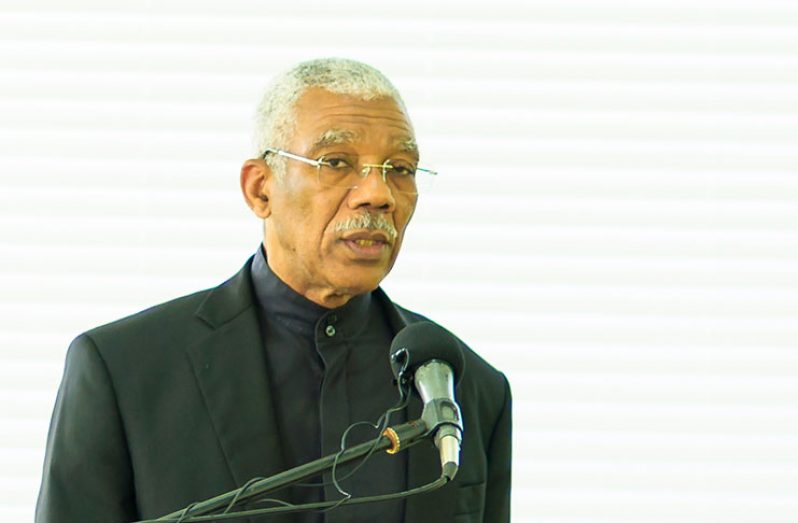…parties, civil society welcome move to reconstitute constitutional body
KEY stakeholders from across Guyana are in high praise of the National Assembly over its decision to approve the members of the Ethnic Relations Commission – a move that will result in the revitalisation of a constitutional organ that has been defunct since 2011.
The names of the 10 persons to sit on the commission were approved last Friday in the National Assembly after more than four years of consultations and reviews. In a late-night interview with the Guyana Chronicle, Social Protection Minister Amna Ally, who is also the General-Secretary of the People’s National Congress/Reform (PNC/R), said it is now for President David Granger to swear in the members and to have the commission reconstituted.
Though the process was delayed, Ally said the resuscitation of the commission is a timely one. “I trust it can benefit Guyanese—that is one of the reasons why the President placed emphasis on social cohesion…we have got to work in tandem with each other (Ministry of Social Cohesion and ERC),” Minister Ally said, while adding that the “country is plagued with racial peculiarities and we have to overcome that.” “It is my hope that with [the] ERC being re-established and working with the Ministry of Social Cohesion, we can certainly take Guyana a step further,” she further added.
Executive member of the Working People’s Alliance (WPA), Dr. David Hinds, told the Guyana Chronicle that the “development” is a welcomed one. “As a party that has never been shy about confronting our race problem, we feel that there should always be such a commission in place. The WPA played some role in the early days of the life of the commission and has continued to take a deep interest in its work,” Dr. Hinds said. He, however, expressed disappointment that for a period the ERC had become a “victim of the PPP agenda of dominance,” and the fact that it has been dysfunctional for such a long time. For him, “it is a crying shame.”
Dr. Hinds said the WPA remains hopeful that the commission will be able to truly fulfil its mandate. “We hope that now it has been reconstituted, it would undertake the kind of serious work that it was initially mandated to do. WPA still believes that good and constructive ethnic relations are pivotal to our collective sense of nationhood. It is for that reason that we feel the ERC should be a non-partisan institution not subject to political pressures from the political parties. This is our hope for the new commission,” he told this newspaper. “It is an oversight constitutional body that is in part in place to ensure that those who feel discriminated against because of their ethnicity have an institution through which to channel their grievance. The ERC, therefore, has a serious mandate in an environment that is often rife with charges of ethnic discrimination,” Dr. Hinds added. He emphasised that the ERC has to strive for impartiality by avoiding partisan entrapment, warning that the WPA will be keeping an eye on the commission’s work to ensure that it does its work in keeping with the constitution.
Long overdue
In a press statement on Sunday, the Indian Action Committee (IAC) also welcomed the move by the National Assembly, saying that it was long overdue. “This long overdue decision, for which the IAC has repeatedly called, clears the way for the members to be officially appointed and sworn in by H.E. President David Granger. The IAC is therefore hoping that this process can be expedited, so that the commission can commence its work soonest,” the IAC stated. The IAC is of the strong belief that the ERC is critical in the process of fostering social cohesion among Guyanese. For this reason, the committee is urging that all Guyanese support the work of the commission and for it to be provided with the necessary resources to execute its functions. African Cultural and Development Association (ACDA) Representative Barrington Braithwaite, who is among the 10 persons appointed to sit on the commission, said though delayed, he is pleased that the ERC is finally coming on stream. “It is four years late,” Braithwaite told this newspaper, noting that he was selected to sit on the Commission since 2014. Nonetheless, he said he is pleased that the members of the ERC have been approved. “It is a commission that will tend to monitor the outrageous expressions and propaganda with a racial overtone,” he posited, while adding that it will also provide clarity on myths that may have been inherited from the days of colonisation.
Private Sector Representative Ramesh Dookhoo said the private sector is “happy,” to have one of its stalwarts, Norman McLean, sit on the commission. McLean had previously served on the ERC in its earlier life. He noted that though the process of approving the members of the commission took some years, the PSC believes that the process was a democratic one. “We are actually very happy and we hope that the ERC can be effective as it should be, given what seems to be the growing ethnic tension in the country,” Dookhoo said.
The 10 approved members hail from different sectors of society. They are: Christian bodies, Dr. John O. Smith; Hindu bodies, Sister Rajkumarie Singh; Muslim bodies, Mr. Roshan Khan; Labour movement, Norris Emanuel Witter; Private Sector Organisations, Major-General (Retd.) Norman Mclean; Youth Organisations, Mr. Deodat Persaud; Women’s Organisations, Ms. Ruth Howard; Cultural/Ethnic bodies, Afro-Guyanese, Mr. Barrington Braithwaite; Indo-Guyanese, Mr. Neaz Subhan and Indigenous bodies, Mr. Ashton Simon.



.jpg)








